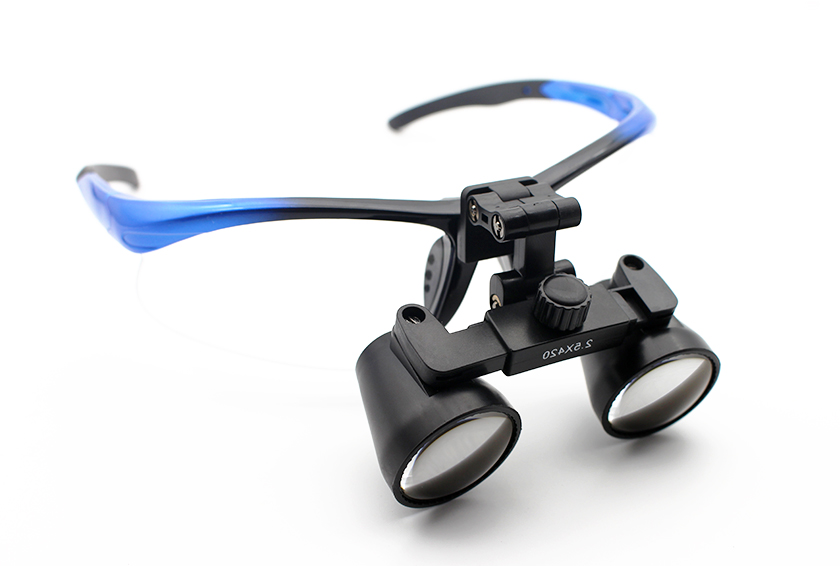How Dental Loupes Can Help Prevent Occupational Hazards for Dentists
Dental loupes are a specialized tool that dental professionals can use to prevent occupational hazards. In dentistry, professionals are susceptible to musculoskeletal disorders, eye strain, and radiation exposure.
These hazards can have significant consequences, such as chronic pain, reduced productivity, and even vision loss. As such, it is essential to prioritize prevention measures to ensure that dental professionals can perform their jobs safely and effectively.
This blog will explore how dental loupes can help prevent occupational hazards and provide an overview of the features to consider when choosing loupes.
Occupational Hazards in Dentistry
Dental professionals are at risk of several occupational hazards. Musculoskeletal disorders are among the most common. These disorders are caused by the repetitive motions involved in dental work, such as bending and twisting. Over time, these motions can cause chronic pain in the back, neck, and shoulders.
Dental professionals are also at risk of developing eye strain due to the prolonged periods of time spent looking at small, detailed areas. Additionally, dental professionals are exposed to ionizing radiation, which can cause cataracts, cancer, and other health issues.
Benefits of Dental Loupes
Dental loupes are magnifying devices that help dental professionals see small areas in greater detail. Loupes work by magnifying the area of focus, allowing dental professionals to work more efficiently and with greater accuracy. The use of loupes has several benefits for preventing occupational hazards. For example:
Improved posture: Dental professionals using loupes are more likely to maintain proper posture, reducing the risk of musculoskeletal disorders.
Reduced eye strain: Loupes help dental professionals see small areas without having to strain their eyes, reducing the risk of eye strain.
Enhanced precision: With greater magnification, dental professionals can work with greater precision, reducing the need for repetitive motions that can cause musculoskeletal disorders.
Better diagnostic capabilities: Dental loupes can help dental professionals detect early signs of decay and other dental issues that may not be visible to the naked eye.
Features to Consider When Choosing Dental Loupes
There are several features to consider when choosing dental loupes. Some of the most important include:
Magnification power: Loupes are available in a range of magnification powers. The power you choose will depend on your specific needs and preferences. Generally, higher magnification powers are better for precision work, while lower powers may be better for general use.
Working distance: This distance refers to the distance between the loupe and the area of focus. A longer working distance may be more comfortable for dental professionals who need to move around frequently, while a shorter working distance may be better for precision work.
Frame style: There are several frame styles to choose from, including flip-up, through-the-lens, and TTL with a headband. Each style has its own pros and cons, and dental professionals should choose the one that works best for their needs.
Other customizable features: Some loupes come with additional features, such as adjustable nose pads, interchangeable lenses, and custom engraving. These features can help ensure that dental professionals get the most out of their loupes.
Proper Use and Maintenance of Dental Loupes
To get the most out of their loupes, dental professionals must use and maintain them properly. Some tips for proper use and maintenance include:
Proper adjustment: Dental professionals should ensure that their loupes are properly adjusted for their individual needs. This includes adjusting the angle, distance, and magnification power.
Regular cleaning: Loupes should be cleaned regularly to ensure that they remain in good condition. Dental professionals should use a soft cloth and a mild cleaning solution to clean their loupes.
Proper storage: Loupes should be stored in a protective case to prevent damage when not in use.
Regular maintenance: Dental professionals should have their loupes serviced regularly to ensure that they are working properly. This may include replacing lenses or adjusting the frame.
Additional Prevention Measures
While dental loupes are a powerful tool for preventing occupational hazards, they are not the only tool available. Dental professionals can also take several other prevention measures, including:
Use of ergonomic dental chairs and equipment: Ergonomic chairs and equipment can help dental professionals maintain proper posture and reduce the risk of musculoskeletal disorders.
Regular exercise and stretching: Regular exercise and stretching can help keep muscles and joints healthy and reduce the risk of injury.
Proper lighting and ventilation in the workspace: Proper lighting and ventilation can help reduce eye strain and exposure to ionizing radiation.
Utilization of radiation shields and other protective equipment: Radiation shields and other protective equipment can help reduce exposure to ionizing radiation.
Conclusion
Dental loupes are a valuable tool for preventing occupational hazards for dental professionals. By providing improved posture, reduced eye strain, enhanced precision, and better diagnostic capabilities, loupes can help dental professionals work safely and effectively. With the right tools and practices in place, dental professionals can perform their jobs safely and effectively for years to come.
For getting the right and best dental loupes, visit Schultz Loupes. Not only do they provide high-quality, durable dental loupes, but they also have a 30-day money-back guarantee and 6 months of interest-free payment plans for added convenience. They also provide a lifetime warranty!


